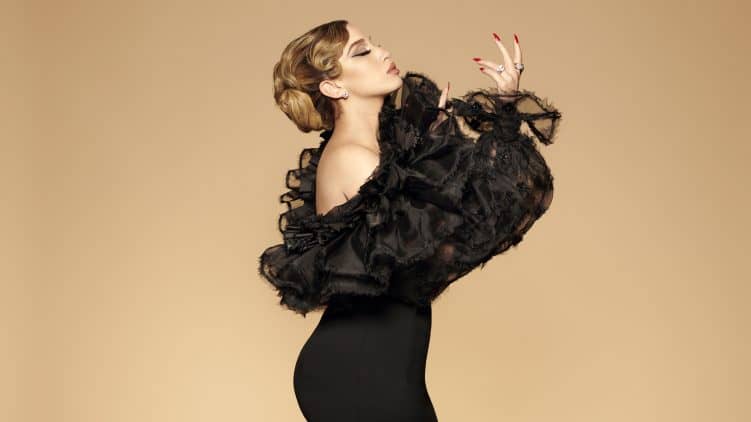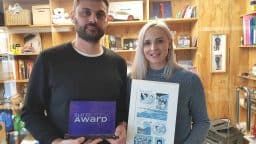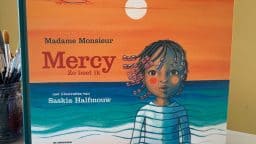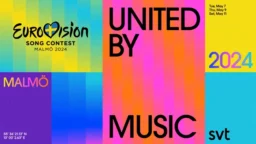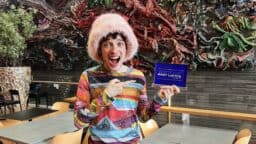The French asked her three years in a row. La Zarra, they asked, will you sing for us at the Song Contest? Twice, the Canadian-French singer said no, she didn’t think she was good enough yet. This year she said yes, and oh, how happy the French delegation leader is: ‘La Zarra is mysterious, she is reserved, she is astonishing.’ Why mysterious? Why reserved? What is astonishing about her? And why does her song, Évidemment, seem cheerful but turns out to be quite sad?
The data
La Zarra is 25, raised by Moroccan-Canadian parents in the fifth largest town in the province of Quebec. She became a hairdresser, always wanted to sing, had a massive hit in 2021, and is now in the Eurovision 2023 final.
So much for the data, now the story. In five steps, with five detours.
Step 1: the important meeting
Fatima Zahra Hafdi is a hairdresser. One evening, she meets renowned producer Benny Adam at a club. Both are slightly tipsy. He sits down at the piano and plays Céline Dion’s Pour que tu m’aimes encore. Fatima sings along – and afterwards, he invites her to his studio the next day.
Detour 1: the frying pan
Fatima is self-taught, without formal vocal training or The Voice experience. Instead: ‘YouTube. Watching a lot of Barbra Streisand, Barbara, Dalida, Charles Aznavour, Édith Piaf, Frank Sinatra. I learned to sing by listening to their songs, and I learned to write by listening to their songs. If you ask my friends how I sang ten years ago, they say: “Like a frying pan”.’
Step 2: the building
How do you create an artist? Producer Benny Adam thinks it through. On that first day in the studio, Fatima and he record a song she wrote, Printemps blanc (‘White Spring’). It’s released in a version with Niro, a well-known rapper, and thus gains attention.
A few more collaborations with hip-hop artists follow, and then something special: Fatima, now known as La Zarra, makes a mashup. She fuses two songs together (see box), the sad À l’ammoniaque by French rap duo PNL, about the harsh sides of life, and Mon dieu by Édith Piaf, a plea to make the love last a little longer.
Detour 2: the name
Fatima becomes La Zarra. Where does the name come from? There are three explanations, and all three are valid:
a) Fatima’s middle name is Zahra.
b) Édith Piaf was called La môme (Piaf), ‘The Little (sparrow)’. ‘La Zarra’ doesn’t mean anything by itself, but it’s a tribute to that other ‘La’.
c) The great nineteenth-century author Victor Hugo (yes, the one from The Hunchback of Notre-Dame and Les Misérables) wrote a poem called Lazzara. It’s about a strong, cheerful, unstoppable girl who drives all men crazy. La Zarra: ‘I especially want to convey that powerful and active side.’
Step 3: the hit
Out of nowhere – four years later – there’s suddenly a hit. Platinum in France: Tu t’en iras.
The song is about disappointment in men. The main line: ‘You’ll leave – just like all the men before you.’ But however sad the lyrics, the melody is cheerful. Just like the music video. In it, we see La Zarra gradually eliminate three men. Literally: the first one is thrown into a ravine, the second swallows a poisoned pill, and the third is shot. The fourth one finally meets the criteria: the famous Canadian drag queen Cookie Kunty.
When asked why the character played by La Zarra in the video takes a grinning photo of her dead men, La Zarra replied: ‘Huh? What are you insinuating? I just happen to have two hobbies. Hairless Sphynx cats and photography.’
Detour 3: bleach
Interviewer: ‘La Zarra, how would you describe yourself in three words?’
La Zarra: ‘Untamable, mysterious, and bleach.’
Interviewer: ‘Bleach?’
La Zarra: ‘I love wiping things clean.’
Interviewer: ‘What would you most like to wipe clean?’
La Zarra: ‘My exes.’
Step 4a: the album
In the year of the hit (2021), a first album with fifteen songs is released. Its title? A not-so-uplifting: Traîtrise, ‘betrayal’.
Here again, the melodies are catchy (‘I love big American songs’), but the lyrics are melancholic. For example, the last line of the chorus in Vie d’artiste reads:
‘In songs, everything is amazing,
but real life is just sad.’
La Zarra during an interview: ‘I tried to make poetry out of my shame.’
‘And how do you feel hearing it now?’
‘Ça va.’
‘You don’t mind listening back?’
‘No, because it’s La Zarra who sings.’
Step 4b: a glimpse
But if we want to know more about Fatima, instead of La Zarra, which song should we listen to? In the same interview, La Zarra’s answer to that question was: ‘Amour de quartier.‘ (‘Neighborhood Love’, see sidebar).
In it, the lines read:
‘All I hear is the sound of bullets flying through the city,
all I hear are the bells ringing – tomorrow will be sad.’
Perhaps this is about a loved one who did not survive a shooting? La Zarra: ‘It tells about a part of my life that lies far behind me, which, I hope, never comes back.’
Detour 4: Piaf
The name of Édith Piaf has already been mentioned three times in this article. The famous French singer of misfortune (1915-1963) is one of the biggest influences on La Zarra. This is clearly audible in Je coule (‘I Sink’), a song about a severely failed love.
La Zarra: ‘No, I am not a reincarnation of Piaf. But my music is a tribute to her. In the past, I was not a fan; her rolling “r” irritated me. Now I find it fantastic.’
Step 5: the Eurovision entry
And now there’s Évidemment (‘Of course’). Once again, a cheerful melody with lyrics full of misery.
La Zarra starts her Eurovision song, after a cinematic musical intro, already quite desperate in the first few lines: ‘My heart, my hands, my eyes, my hips: nothing is mine anymore.’
And, a bit further on: ‘In my hellish garden, flowers grow that I water with my dreams and my tears.’
Or later on: ‘Even if you stand on the roof of the world, you still can’t reach the sky with your fingers.’
The lyrics mainly consist of disappointment about life and love (‘It’s always too beautiful to be true, but never too ugly to be untrue’), but in the bridge, something of a completely different order happens. La Zarra suddenly addresses the listener directly: ‘I stand here naked before you. Give me a chance from me to you, from you to me!’
And then – hold on – she starts singing about this Eurovision song! She literally asks us: ‘Have I managed to sing [for] the great France?’
No other Eurovision participant has ever done this before, checking halfway through if they’re doing well. Including a joke about the ‘great’ France, probably alluding to the fact that she is only the second French participant ever from Canada (after Natasha St. Pier in 2001 with Je n’ai que mon âme.)
Detour 5: the goat
So yes: La Zarra is astonishing, because of the courage to ask halfway through her song if we’re satisfied,
La Zarra is reserved, because of this statement: ‘The love of the audience is too much for one person. But I do want to try to answer that love,’
and yes, La Zarra remains somewhat mysterious, because of the private information she does want to share with us: ‘I have a parakeet named Chloë. She only started talking when I sang to her. And I have two Sphynx cats; the oldest is called Zelda. They’re going to a cat hotel during Eurovision, where they’ll be spoiled because they’re little princesses. And if I had a goat, I would name it Bernadette.’
Sources (among others):
https://www.enroute-eurovision.fr/video/en-route-avec-la-zarra-interview-questions-reponses/
https://www.youtube.com/watch?v=LTrsGwM2dm8
https://www.youtube.com/watch?v=VlFNWdYHNOQ
Photo: SLAM/Eurovision.tv
